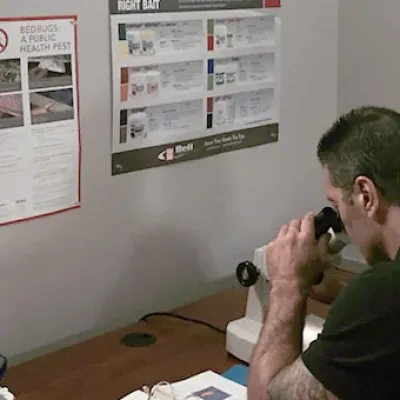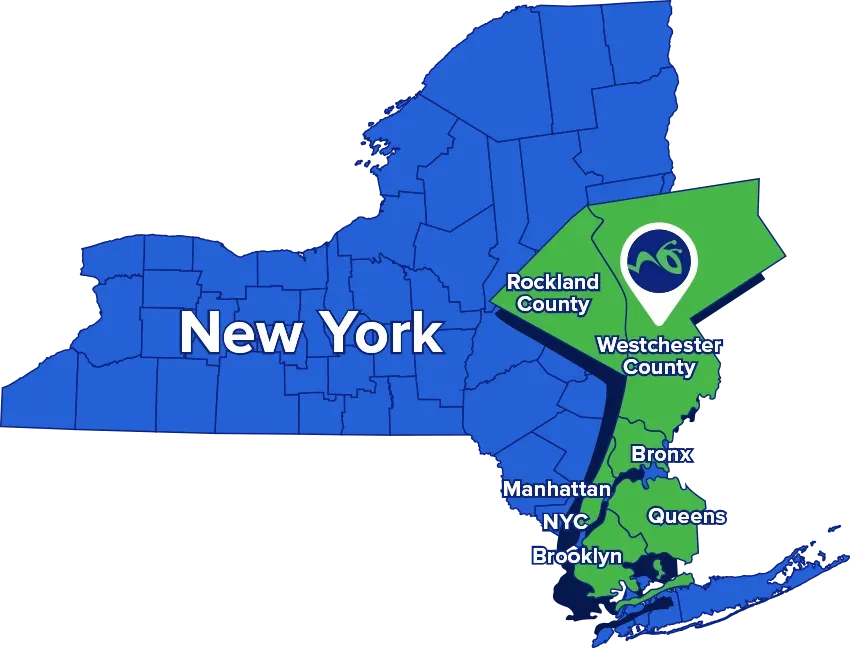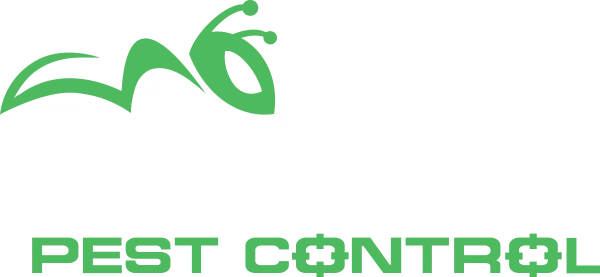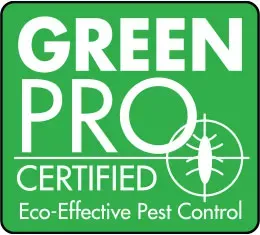Fast, Effective Pest Control That Actually Works
Are pests disrupting your home life? Suburban Pest Control has been solving pest problems for over 5 decades. Our Pest Control Protection program offers a comprehensive solution to keep your property pest-free year-round. We understand the frustration and discomfort pests can cause, which is why we've developed a proactive approach to pest management.
- Eliminates current pest infestations
- Prevents future pest problems
- Customized treatment plans for your specific needs
- Three treatments annually to ensure year-round protection
- Expert technicians trained in the latest pest control methods
Our seasonal approach targets pests before they become a problem, addressing everything from winter-hiding rodents to summer pests. With Suburban Pest Control, you can enjoy a pest-free home without the worry of recurring infestations. Let us handle your pest concerns so you can focus on what matters most - enjoying your home.
Innovative Pest Protection
Pests are something that you never want to see in your home, so we know how uncomfortable it can be to have a pest control problem. That’s why at Suburban Pest Control, we have incorporated our innovative Pest Control Protection program. Not only do we want to help you regain your peace of mind, but we also aim to provide the best services in a friendly and timely manner. With our Pest Control Protection program, you can expect:

- An in-depth pest control consultation and pest assessment
- Implementation of a customized pest treatment plan for the best, most effective treatment
- Three pest treatments each year are designed to proactively treat your property before pests become an issue
- Structural repairs, closing easy access points for pests at an additional cost
- And more!
Pest Control for A Variety of Needs
Our pest exterminators are trained to tackle a variety of pest control needs. When it comes to eradicating your pest control problem, our exterminators are highly trained and experienced. We offer services such as:
- Rodent Control
- Roach Control
- Ant Control
- Flea & Tick Control
- Bee Control
- Wasp Control
- Stink Bug Control
- And more!
Providing Comprehensive Pest Control Since 1974
At Suburban Pest Control, your protection is our main concern. With over 52 years of professional experience in the pest control industry, our local exterminators are trusted in their respective fields. Our technical department is comprised of innovative experts who develop cutting-edge solutions to eliminate any pest control issue, whether it be big or small. Intensively trained and fully equipped, our exterminators are ready to take on even the most demanding of pest control problems, outside the scope of our pest control program, including pests like:
- Mosquitoes - Our mosquito reduction service utilizes environmentally friendly products to reduce the mosquito population around your property significantly.
- Bed Bugs - Our bed bug control treatments include conventional spray treatments, thermal treatments, and steam treatments, as well as pack-up services.
- Wood-Destroying Organisms (Termites, Carpenter Ants) - These types of pests require involved treatments to fully eliminate.
Frequently Asked Questions
Got questions about pests in Westchester County, Rockland County, or the Greater New York metropolitan area? Our FAQ section covers everything you need to know about common infestations, treatment options, and what to expect from Suburban Pest Control’s services. Whether you're dealing with rodents, bed bugs, or termites, we’re here to help you make informed decisions.
What makes Suburban Pest Control different from other pest control companies?
Most people just want pests gone…and gone for good.
What makes Suburban Pest Control different? We don’t just show up when there’s a problem.
We prevent pest problems in the first place with proactive, year-round protection for your home and family.
We’ve been trusted in Westchester, Rockland, and NYC since 1974, and thousands of homeowners count on us for fast, friendly, highly-trained pest professionals and treatments that actually work.
With our Pest-Free Guarantee, you’ll never be left guessing. If something pops up between visits, we come back out at no extra charge.
Check out our 5-star Google reviews and call us for a complimentary assessment.
No stress. No surprises. Just real protection, from people who care.
How do I schedule a pest assessment?
Scheduling a pest assessment is easy.
Just call us at 914-375-0811 or book online anytime.
Our friendly team of pest professionals will answer your questions, walk you through your options, and get your property on the schedule — often within 24 hours.
The best part? Assessments are quick, no-pressure, and free.
Let’s get ahead of the pests before they get into your home.
What should I expect during the initial assessment?
During your complimentary pest assessment, a pest control expert will:
- Understand what you’re seeing, hearing, or experiencing
- Ask a few quick questions about your property and pest activity
- Explain what might be causing the issue and how we typically treat it
- Recommend your next best step — whether that’s a service visit or a more comprehensive inspection
You’ll get real answers and expert guidance in just a few minutes. No obligation, no pressure.
If it sounds like a good fit, we can often schedule your first visit the same day or next.
Why should I choose Suburban Pest Control?
Most people don’t have time to deal with a surprise pest problem.
That’s why Suburban Pest Control focuses on proactive, year-round protection — so you can focus on life, not pests.
Here’s what makes us different:
- Established in 1974 and trusted by thousands of NYC, Westchester, and Rockland residents
- Family-owned and local, so you’re not calling some faraway franchise
- Proud members of the National Pest Management Association
- Our affordable Proactive Protection Membership includes:
- Year-round treatments
- Our Pest-Free Guarantee: if pests come back, so do we. For free.
- Year-round treatments
Whether you own a home, manage a property, or run a business, you’ll get fast service, expert techs, and real peace of mind.
Call us today to schedule your free pest assessment, and we’ll take care of the rest.
What areas do you service?
We proudly serve Westchester County, Rockland County, and most of New York City.
Not sure if you're in our service area? Just give us a call. We’re happy to check and point you in the right direction.
As a trusted local provider since 1974, we know the pest issues unique to this region — from brownstone rodents to suburban carpenter ants — and we tailor every plan to your home or business.
Whether you’re in a city high-rise or a home in the Hudson Valley, we’ve got you covered.
What if pests return between treatments?
If pests come back between your scheduled services, just call us and we’ll return and retreat at no extra cost for any covered pest.
That’s our Pest-Free Guarantee, and it’s built to give you total confidence in our service. Most common pests like ants, roaches, spiders, and rodents are included in your coverage.
We believe pest control shouldn’t be one-and-done.
It should be proactive, reliable, and backed by real support when you need it.
That’s why we’re on a mission to protect and provide peace of mind through proactive and effective pest control.
Do you handle stinging insects safely?
Absolutely. When it comes to stinging insects, safety is always our top priority — for your family, pets, and our team.
Our licensed pest professionals will:
- Quickly identify the species (wasps, hornets, yellow jackets, cicada killers, ground bees)
- Assess the nest’s location and threat level
- Apply targeted treatments that are effective and family-safe
Proactive Protection Members receive routine inspections and preventative treatments, so we often find and treat nests before they become a serious risk.
If you see stinging insects near your home or business, don’t try to handle it yourself — call us, and we’ll take care of it.
What about bed bugs - do you offer different treatment options?
Yes, we offer comprehensive and highly effective bed bug treatments tailored to your situation.
Our treatment options include:
- Conventional spray applications for targeted control
- HEPA vacuuming to remove live bugs and eggs
- Steam treatments that kill bed bugs on contact
- Pack-up services to help you prep your space safely and efficiently
Whether it’s an early detection or a full-blown infestation, our licensed pest professionals use the latest tools and strategies to eliminate bed bugs quickly and completely and with minimal disruption to your home or business.
We know bed bugs are stressful. We're here to help you through it with fast, discreet, and proven solutions.
Call us today to schedule an inspection or learn which treatment is right for your situation.
How quickly can you respond to pest problems?
We know how stressful pest problems can be for you and your family.
Pest problems don’t wait, and neither do we. Our team responds to all service inquiries within 24 hours or sooner, and in many cases, we can be on-site the same day.
We’re available 7 days a week, year-round, to tackle urgent pest issues quickly and professionally, because we know your comfort and safety can’t be put on hold.
Need help now? Call or message us, and we’ll take care of it.
Do you offer commercial pest control services?
Yes, we specialize in proactive commercial pest control for a wide range of businesses, including offices, restaurants, food and pharmaceutical facilities, medical buildings, warehouses, and multi-unit commercial properties.
Our commercial clients rely on us for:
- Tailored service plans based on your industry, facility size, and regulatory needs
- Detailed service reports and audit-ready documentation
- Discreet, licensed technicians who understand how to work in sensitive environments
- Priority scheduling and fast response when issues arise
We’ve helped businesses across Westchester, Rockland, and NYC stay pest-free and inspection-ready since 1974.
Let’s talk about a plan that protects your operation, without disrupting it.
How much does pest control cost?
That’s a great question, and honestly, the cost depends on a few things like the type of pest, size of the property, and how severe the problem is.
But here’s the good news: most of our customers choose our Proactive Protection Membership because it gives them year-round coverage and peace of mind.
It’s an affordable monthly plan that includes regular treatments and unlimited callbacks at no extra charge. And with our “Pest-Free” Guarantee, we’ll come back out for free if pests pop up between visits.
Plans start as low as $59, but the best way to know what’s right for you is to call for a quick, free assessment.
Let us assess your individual pest problem and give you clear answers — no pressure.
What's your guarantee policy?
We stand by our service with our Pest-Free Guarantee.
If you ever see pests between scheduled visits, just give us a call and we’ll come back and treat again at no extra charge.
It’s part of what makes our Proactive Protection Membership so popular. Our members love knowing they’re covered year-round, with fast and reliable service whenever they need it.
Nobody likes an unexpected pest problem. That’s why we created our Pest-Free Guarantee.
If pests pop up between regular visits, we’ll come back and take care of it…free of charge.*
✅ No hassle. ✅ No hidden fees.* ✅ Just pest control that actually does its job.
*Includes covered pests under your Proactive Protection membership or details of your targeted pest program.

Areas We Service in New York
Our family has been proudly serving Westchester County, Rockland County and New York City area with quality pest control solutions since 1974. We know this area, and the pests that are found here, like no other, and are able to create customized pest control plans to better suit your needs!








